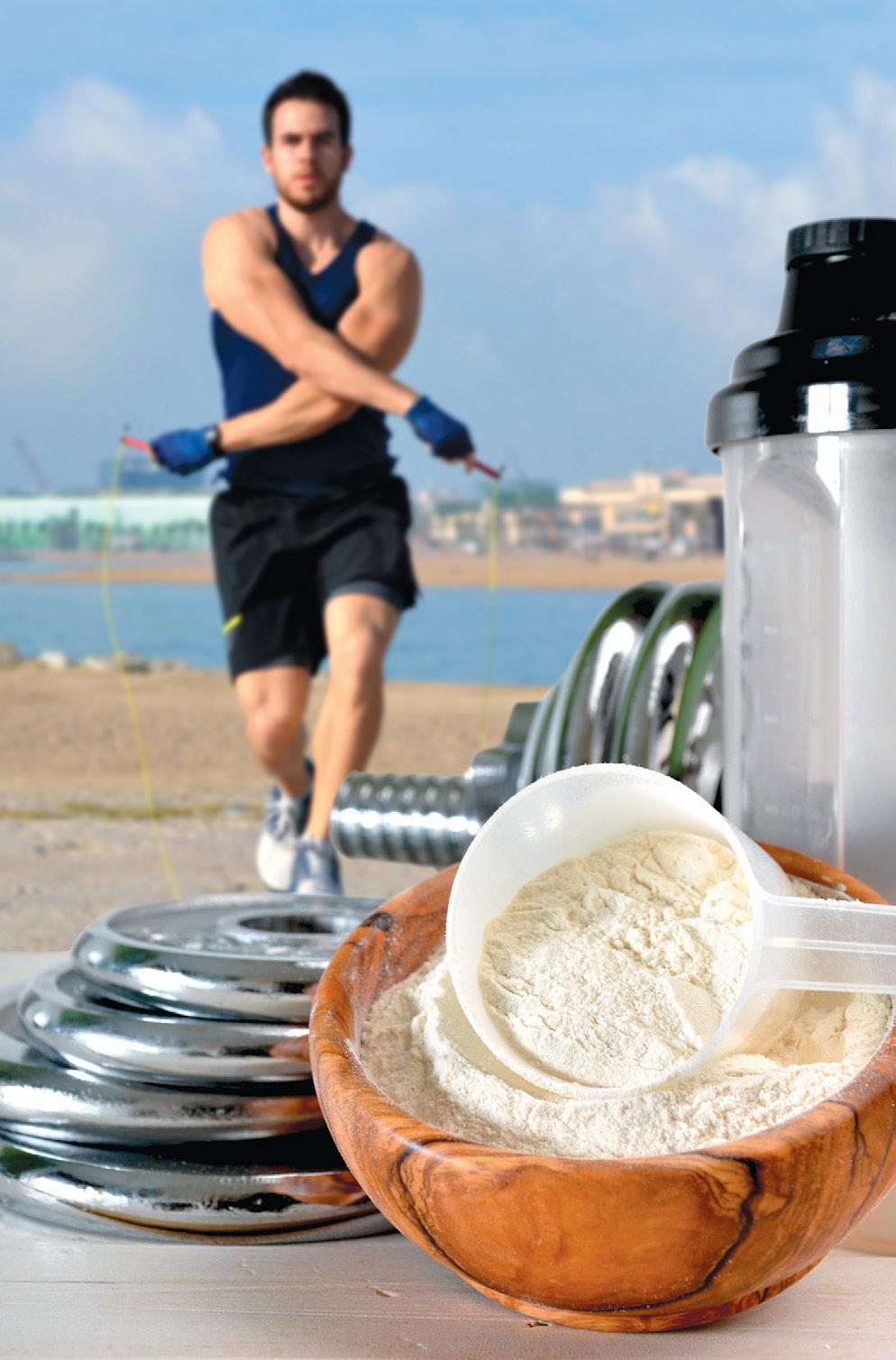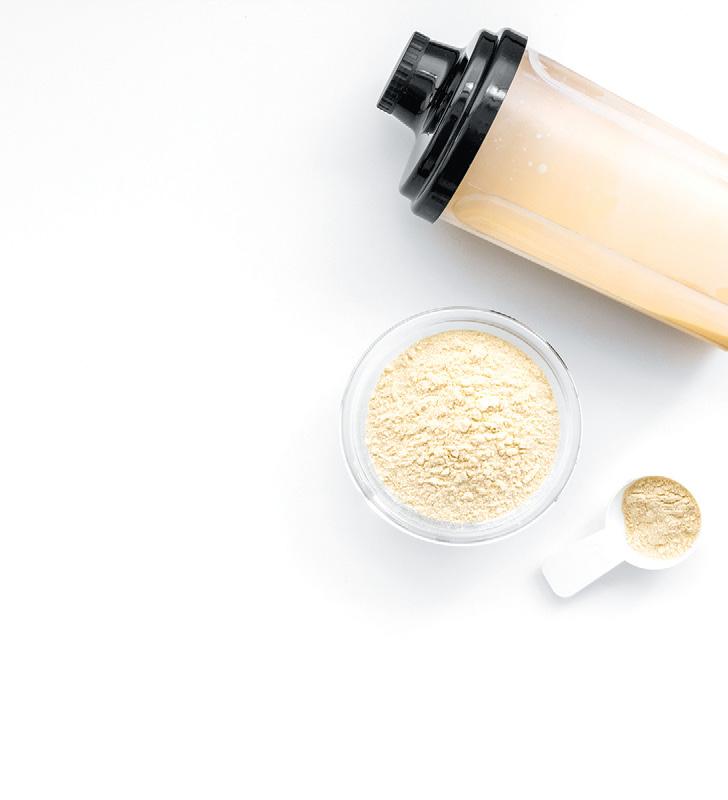
5 minute read
fit body
POWER UP YOUR WORKOUTS
a guide to protein powders and shakes
Advertisement
by Maya Whitman
expressiovisual/AdobeStock.com Protein, from the Greek proteios, means “primary”, which sums up its vital role in the human body. Its structure of amino acids enables myriad bodily functions, from repairing and building tissues to creating biochemical reactions that form enzymes, hormones and neurotransmitters, and maintaining pH and fluid balances. When we fortify our diet with digestible, nutritionally dense, non-meat protein, we also amp up our fitness efforts, enhance immunity and offset premature aging. Whole-food and plant-based proteins like pea, quinoa and chia seeds are also strong allies against Type 2 diabetes, research shows.
The Protein Promise
Whipping up a protein drink before or after a workout can foster muscle and joint integrity, and it can nourish soft tissue after injury. “Protein is vital for muscle synthesis. An individual who exercises at a higher intensity should focus on getting more protein in their diet to aid in better recovery,” says Hannah Davis, a personal trainer and owner of Body By Hannah, in Cleveland, Tennessee. “Protein is also important in overall nutrition to better balance hormones that control hunger, blood sugar and mood.”
Dominic Kennedy, a Los Angeles trainer and the creator of The Dominic Effect health and fitness app, concurs. “Protein is considered a ‘macronutrient’, which means we typically need a large amount to stay healthy. Certain protein powders can be very healthy for you and help to build and repair tissue.”
The average daily protein requirement for adults is 50 to 70 grams, but can be higher during times of stress, injury, illness, pregnancy or breastfeeding.
Vegan fitness and nutrition coach Karina Inkster, in Powell River, British Columbia, gives a nod to protein shakes for their convenience, but advises, “Just make sure you’re not relying just on protein powder to hit your daily protein.” She highlights the importance of diet diversity with other protein sources like tofu, tempeh, legumes, nutritional yeast, nuts and seeds.
Choosing Nutrition, Nixing Added Sugar
Thirty years ago, heavily sweetened, incomplete protein powders seemed to be the only game in town. “Nowadays, we have countless plant-based options for protein powders—pea, rice, soy, hemp, pumpkin seed, quinoa … the list goes on,” says Inkster. “I like to stick to the basics, as I have a lot of serious food allergies. I go with brown rice and/or pea protein. Single ingredients, no flavors and no sweeteners.”
For Kennedy, shakes and powders with sugar and dairy can contribute to bloating and store fat in the body, “which we need to work harder to burn off. I cannot stress the difference this has made in my body once I gave it up years ago. Not only do I look better physically, but most importantly, I feel better on the inside. Sugar is highly addictive and can also affect your mood.”
Davis prefers sourcing her protein requirements from whole foods, but recommends whey-based powders when her clients want a reliable power shake and can tolerate it well.
Protein-to-carbohydrate ratio is paramount, especially for those with weight-loss goals or blood sugar instability. Reading labels is important, especially when food intolerances are an issue. Kennedy recommends experimenting with various protein sources. “If you are using whey protein and having trouble digesting it, it may just be a lactose intolerance. Trying one that is plant-based could be a game-changer.”
Among Inkster’s clients, brown rice and pea protein powders score high for digestibility and assimilation.

Fortifying Additions
From antioxidant-rich pomegranate powder to blood-sugar-supportive monk fruit and adrenal- and thyroid-nourishing maca, nutritional extras abound. However, Inkster notes that supplemental products marketed as superfoods, including collagen, do not necessarily pack a powerful punch to an already nutrientdense diet. “When we ingest collagen or a vegan alternative, this protein gets broken down into amino acids in the exact same way as any other protein we eat.”
Kennedy points to super-green and pomegranate powders as ways to help the body combat chronic disease. “It’s a great way to get more greens and vegetables and in turn, promote a healthy immune system. We could all use more of that.”
Davis reminds us that one person’s nutritional ally can be another’s bane. “Supplementation is very personal. I always encourage focusing on a whole foods diet that includes a lot of variety to create a micronutrient balance in the body and then experiment with some supplements to see how they may help.”
Maya Whitman writes about natural health and living a more beautiful life. Connect at Ekstasis28@gmail.com.
Guide to Protein Powders
Protein supplementation is an $18 billion global industry, so sifting through options for our own lifestyle and constitution can be daunting. These descriptions of protein powder sources may help:
CHIA SEED: vegan and naturally gluten-free; heart-healthy, supports bone health and enhances insulin sensitivity; supports healthy weight loss due to fiber content; natural source of calcium (average protein percentage: 12 to 16 grams per scoop)
EGG WHITE: lowers risk of cardiovascular disease and lowers blood pressure; improves muscle repair; cholesterol-free (average protein percentage: 25 grams per scoop)
HEMP SEED: vegan and naturally gluten-free; easily digestible, nutrient-dense protein containing all essential amino acids; helpful in reducing inflammation and contains healthy fats and antioxidants (average protein percentage: 15 to 20 grams per scoop)
NON-GMO PEA: vegan and naturally gluten-free; builds muscle mass and improves tone; contains all essential amino acids; promotes satiety and a natural source of iron (average protein percentage: 20 to 25 grams per scoop)
ORGANIC BROWN RICE: vegan and naturally gluten-free; aids in muscle recovery, helps to burn fat (average protein percentage: 25 grams per scoop)
PUMPKIN SEED: vegan and naturally gluten-free; alkalizing and high in zinc; lowers risk of certain cancers and improves reproductive and intestinal health (average protein percentage: 22 to 35 grams per scoop)
WHEY (COW- OR GOAT-SOURCED): builds muscle mass via anabolic hormones like insulin; goat whey offers high nutrition and protein with fewer sensitivities than cow’s milk (average protein percentage: 25 to 30 grams per scoop)






